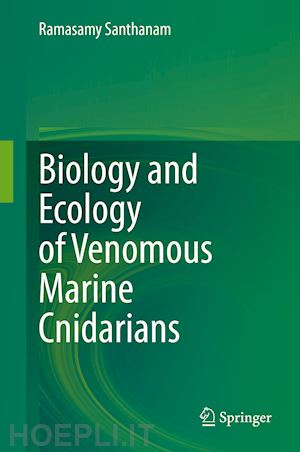
Questo prodotto usufruisce delle SPEDIZIONI GRATIS
selezionando l'opzione Corriere Veloce in fase di ordine.
Pagabile anche con Carta della cultura giovani e del merito, 18App Bonus Cultura e Carta del Docente
Seas and oceans cover 71 % of the earth’s surface and they are home to 80% of all life found on the planet . Among the different components of marine life, the phylum Cnidaria (formerly Coelenterata) has been reported to be responsible for more envenomations than any other marine phylum. It is believed that 2% of its known 11000 species are venomous to humans. Incidents caused by jellyfish are common all around the globe, with serious manifestations and occasional deaths reported in some countries. The Australian box jellyfish, Chironex fleckeri , has been reported to be very dangerous to humans, as contact with its tentacles can provoke immediate cardiovascular collapse and death within minutes. Though other volumes on venomous marine fauna are available, this is the first comprehensive book focusing on venomous marine cnidarians. It is a valuable text-cum-reference resource for researchers, teachers and students of various disciplines, including fisheries science, marine biotechnology and marine biology and for university and college libraries. It is also a useful guide for beachgoers, divers, physicians and environmentalists.
Dr. Ramasamy Santhanam is the former Dean of the Fisheries College and Research Institute, Tamil Nadu Veterinary and Animal Sciences University (now the Tamil Nadu Dr.J.Jayalalithaa Fisheries University), India. He has 50 years of teaching and research experience in marine sciences and his fields of specialization include marine biology and fisheries environment. He is currently serving as a Fisheries Expert for various government and nongovernment organizations in India and abroad. Dr. Santhanam has published 29 books on various aspects of marine life, marine plankton and aquaculture. He was a member of the American Fisheries Society, United States; World Aquaculture Society, United States; Global Fisheries Ecosystem Management Network (GFEMN), United States; and the IUCN’s Commission on Ecosystem Management, Switzerland.











Il sito utilizza cookie ed altri strumenti di tracciamento che raccolgono informazioni dal dispositivo dell’utente. Oltre ai cookie tecnici ed analitici aggregati, strettamente necessari per il funzionamento di questo sito web, previo consenso dell’utente possono essere installati cookie di profilazione e marketing e cookie dei social media. Cliccando su “Accetto tutti i cookie” saranno attivate tutte le categorie di cookie. Per accettare solo deterninate categorie di cookie, cliccare invece su “Impostazioni cookie”. Chiudendo il banner o continuando a navigare saranno installati solo cookie tecnici. Per maggiori dettagli, consultare la Cookie Policy.